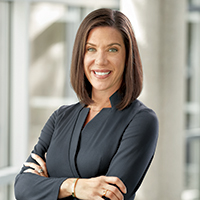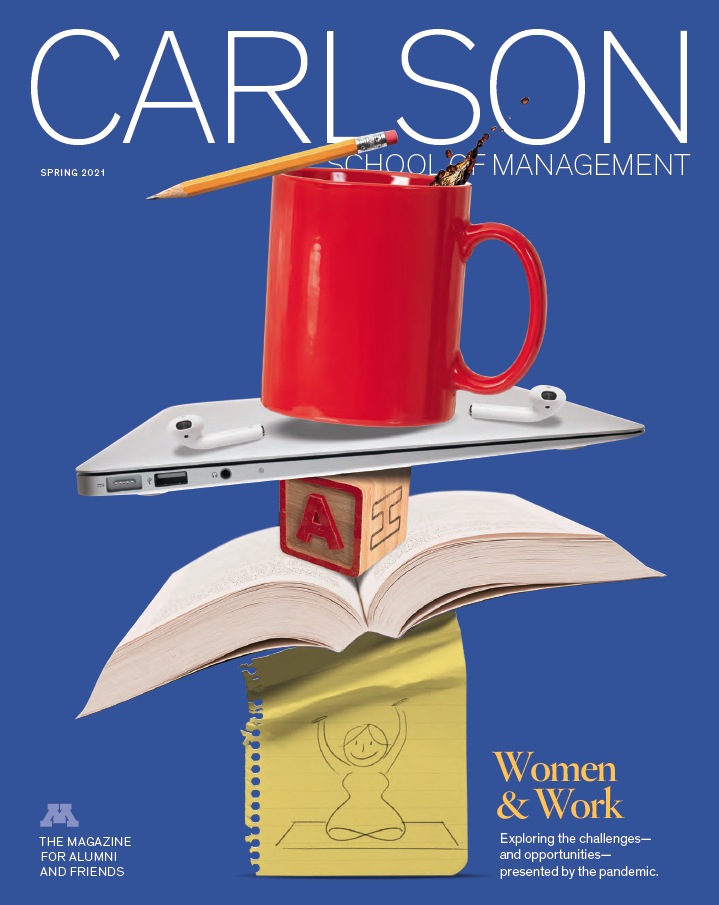
Principled and Poised During a Pandemic
Friday, April 2, 2021
BY STEVE HENNEBERRY
The way we shop has forever changed. A strong shift to digital, as seen during the pandemic, means a company like Best Buy has to adapt. That’s exactly what they’ve done, under the leadership of second-year CEO Corie Barry.
The 46-year-old Barry has moved the Richfield–based retailer to think differently about the role of its locations to better fulfill online orders while still providing important in-store experiences. She also placed priority on the safety of Best Buy’s employees and customers.
In a recent interview, she discussed the impact of the pandemic, Best Buy’s commitment to diversity, equity, and inclusion, and more.
How has the pandemic impacted Best Buy’s purpose?
We believe our purpose is to enrich lives through technology, and that’s more than a tagline for us. That genuinely is how we think about helping our customers get done what they want to get done. They don’t just come in for a television, especially not in a pandemic. They come in to entertain their family. There’s something bigger that they want to achieve. And through our expertise, we can help them do that...Our belief system around what we thought we could uniquely do for people actually has come to life in really interesting ways. Customers are saying, ‘no, it’s not just a computer. I need the suite of tools that now will enable me to work from home.’ It’s a webcam and speakers. It’s a keyboard. That’s just a really different way of thinking. We’re not just there to sell you that one SKU. We want your experience to deliver on—actually, to exceed—your expectations.
What does retail, generally, look like in the next three to five years?
I would start from a place of the customer is in control. The customer has gotten used to [shopping] in whatever way they want, and it was really driven by safety. The second major implication is that they have a very high bar for the experiences they expect. And that’s not just about retail. If I have a great app experience using a travel website, or if I have a great experience with my doctor and telehealth, I will expect aspects of that experience to carry over into my retail experience. The third implication is that most customers are likely to start digitally with your brand. I knew the day that my dad ordered curbside grocery pickup that the world changed. I mean, this was a man who was not getting on an app and ordering his groceries. Yet the first time he did it, now he’s comfortable with it. That means he’s comfortable with a lot of other digital-first experiences as well. His perspective on how he will interact with brands has changed forever. Together, that rewraps the way that retail needs to think about how do you invest, where do you invest, and what’s going to be important in the future?
What was your reaction to George Floyd’s murder and the calls for racial justice that continue? Can you tell us more about Best Buy’s commitments moving forward?
I could feel the soul of our community, and therefore our teams, in such abject pain. I felt immediately our employees and our customers looking to us as leaders to drive change—and really different change than we had ever seen before. And I also could feel immediately such an immense sense of frustration, and especially in Minnesota, where we knew empirically that we have some of the largest gaps in the country in terms of access to education or in terms of wealth. I think we all immediately felt a very high sense of responsibility to do something.
We said, ‘We will do better,’ at our company, in our community, and across the country. We committed to making systemic and real permanent changes. That includes dedicating millions of dollars to building a talent pipeline and teaching the youth necessary skills to be relevant in areas where the economy is growing and changing. The biggest way that we had done that is through our Teen Tech Centers. They’re usually in more disinvested areas and aimed at teens who can develop skills through access to technology and to mentorship that they might not otherwise have.
We have 40 centers currently, and we have committed to having 100 by 2025. That will serve 30,000 students across the U.S. From there, what becomes important is how do you actually create the pipeline for those students? We also created scholarships specifically for HBCU students, and we’re increasing the scholarship funding for those Teen Tech Center youth across the country. Also, we want to create other opportunities for teens to explore all different types of post-secondary options that’s going to prepare them for future success. So it’s this idea of, ‘How do you start really early and then fill that pipeline in a way that really pumps that talent back into these great companies in our community?’
Best Buy’s board is half female and a third people of color. What’s the value for you personally, and for the company, in having that diverse base of expertise and experience accessible to you?
Diversity is good for business and it has been proven empirically over time. It is also very clear when you surround yourself with diversity— whether that’s gender, ethnicity, experience, background, age—a more diverse approach means you will look around the corners of problems in a different way. So for me, as a leader, it is wonderful to work with a board that so clearly reflects that diversity.
When we talk about issues of diversity and inclusion, not only are they supportive in our efforts, they’re actually pushing on us to think differently about our role as a company. That is an incredibly wonderful place to be. It means you come to really differentiated solutions because you’re getting all these different points of view. Every time there’s at least one question that we would not have thought of based on our life experience and our point of view.
What do you think are the most important skills or lessons that students looking for a career in business should learn so that they can be successful?
Robert Stephens, the founder of Geek Squad, attracted employees who cared so much about the customer, about doing what was right, and going to the end of the world for the customer. I wondered what it is that he looked for in people. He said it was three things: curiosity, drive, and ethics. Now, trust me, all of the skills you learn in school are important. But, that’s almost an expectation. The question is what will differentiate you in an environment that is incredibly ambiguous and changing constantly? This idea of curiosity, drive, and ethics has always stuck with me because if you’re curious to listen to other points of view, to seek out the answer, to do the research; if you have the drive to be self-motivated and to push the questions to the ends of the earth; and then if you do it in a way that is ethically and morally aligned with the organization you’re at—you will stand out amongst the crowd.

